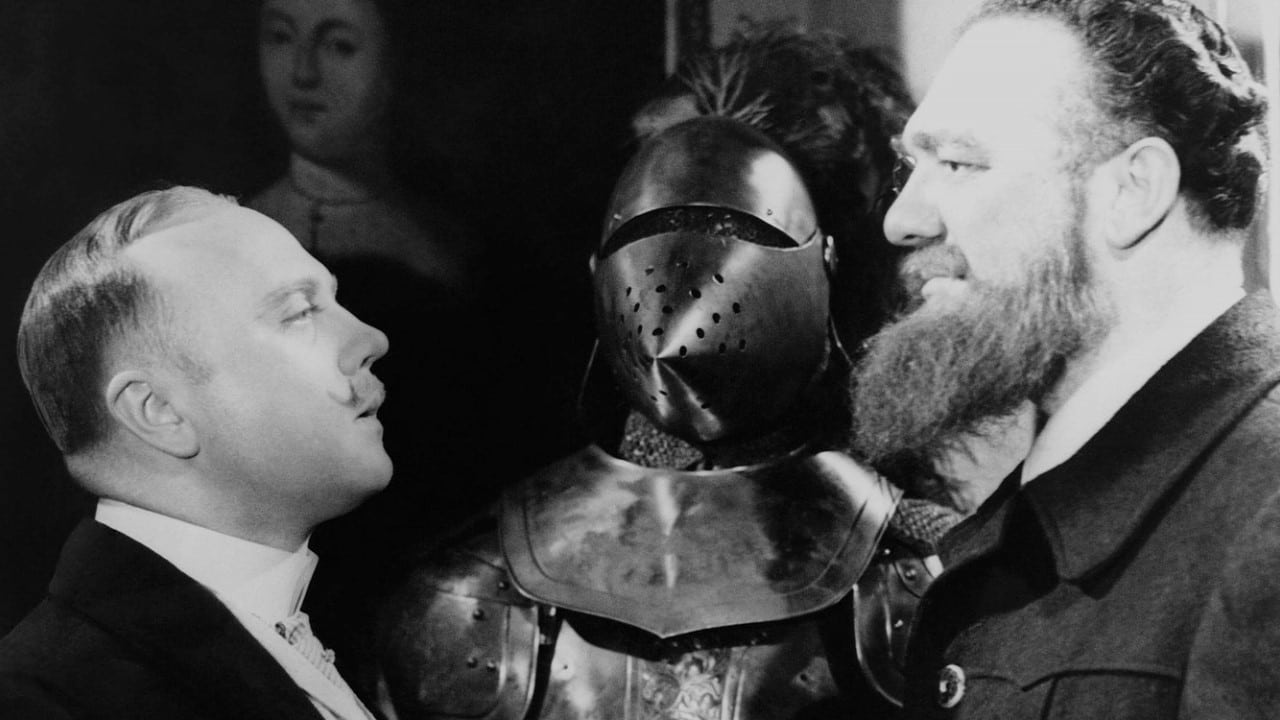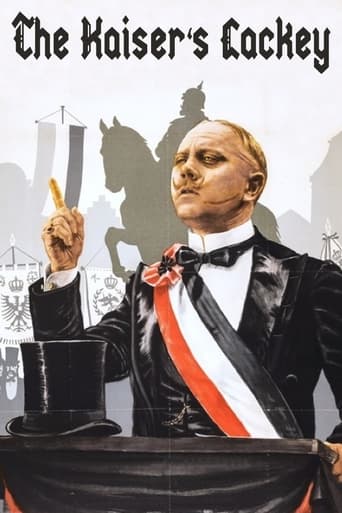CheerupSilver
Very Cool!!!
Inadvands
Boring, over-political, tech fuzed mess
ChicRawIdol
A brilliant film that helped define a genre
DipitySkillful
an ambitious but ultimately ineffective debut endeavor.
Horst in Translation (filmreviews@web.de)
I will not give you all the English-language titles listed here on IMDb for the German 1951 film "Der Untertan". If you do the maths, this film was made 65 years ago and Germany already existed as FRG and GDR. These 105 minutes here come from East Germany and are still among the most known the country has come up with in terms of movies. It is a black-and-white film, but of course already has sound. Writer and director is Wolfgang Staudte and he adapted Heinrich Mann's novel together with his father Fritz into this film. Unfortunately, I cannot say it was particularly good watch. Lead actor Werner Peters plays his part well though and you could see that he was very experienced indeed. I came across him recently in the Oscar-nominated "Nachts, wenn der Teufel kam", for which he won a German Film Award and he appeared in many films in the 1950s and 1960s that are still well-known today.As for "Der Untertan", I guess the main reason I was not too impressed was the monotonous script by father and son Staudte. Or maybe it was also Mann's fault. I have not read his famous "Der Untertan", but I think that it should never be required to read a book in order to appreciate a movie. It does help for sure in understanding the material and plot, but I am off the opinion that it should never be essential. There were some political references in here, but none got me hooked really. Ultimately the story is about a man who follows one model to perfection: Suck up to everybody above you. Look down arrogantly on everybody below you. And he became so obsessed in this pattern that he forgot to honor everything that is dear to him. Or was his wife really dear to him or did he just marry because it fit the emperor's and society's way of thinking? Decide for yourself. The ruins in the end are very telling.And let us be honest: These people exist today as well, actually far too many of them who follow this concept. And it is pretty despicable. I would not call this film here despicable, but I cannot call it a fulfilling watch either. Not recommended.
MartinHafer
To fully understand "The Kaiser's Lackey" (of "Man of Straw"), you need to understand who made the film and the purpose of it. This is an East German film and in the view of the German Democratic Republic (the Soviet-controlled East Germans), the enemies of the State are the upper and middle classes--particularly those who control the means of production (this is from Socialism 101 as taught by Professor Marx). So, the film looks at the reign of Kaiser Wilhelm II as a struggle between the workers and these ultra-nationalists--in a single representative town and featuring a particularly nasty and soul-less man (Diederich Heßling). The film follows Heßling from his childhood to adulthood--during which he used his position and privilege to exploit or ignore those beneath him, while sucking up to all those above him in the social system.While not obviously funny when you watch it today, the film is social satire. Naturally, the film was the party line in East Germany and was embraced. However, its reinterpretation of history (which ignored liberal reforms and blamed the Prussian middle-class and militarism on the Nazis) did not sit well in the West--especially since West Germany was being rebuilt and molded by the middle and upper classes. Because of this, the film was at first suppressed and only allowed to be released with a few judicious edits---most of which seem very harmless today but which were fuel for the Cold War at the time. Much of this analysis is NOT because I am some sort of a genius--the special features on the DVD featured a professor from UMass-Amhearst that analyzed and explained the film--something that you should definitely see.Well acted and thought-provoking. While its history lesson is a bit simplistic, it is well made and quite compelling.
Terrell-4
It's not all that often that toadies get what's coming to them. Too often, when their political toadying days wind down, they join important New York law firms or become Washington "consultants," toadying in only a slightly different milieu, and able now to directly afford their bespoke suits and strip steak dinners at The Capital Grille. But then we have Diederich Hessling. The place is Germany and the time is before the turn of the century. Diederich (Werner Peters) is a superior toady in this superior East German satire from 1951. Hessling is an unlikable, pudgy little man, with a small, soft mouth. He is a perfect bourgeois, inwardly anxious and outwardly pompous. He was a fearful child, frightened of his father's cane and his mother's stories. Tattling on others at school was his satisfaction. He was attracted, while at university, to the shy Agnes, but when warned off by her family's boarder one evening, he hurriedly left her home. He joined with pride the Neo Teutons to drink beer with careful rituals and fearfully gained a dueling scar. As a cadet in the Kaiser's army he realized, we are told, that "the whole military set-up was aimed to reduce one's dignity to a minimum. This impressed him. Despite his misery he was filled with respect." Alas, his flat foot hurt, he said, and soon he was released with dramatic tales to tell. Then he must manage his family's factory when his father dies, lording it over the workers and nuzzling the town's leaders. He also manages to seduce the loving Agnes, who, having acquiesced is now of course unworthy of a man of his stature. His self-importance is as prominent as his newly up-turned moustache, identical to the Kaiser's. And now this pompous little man, Diederich Hessling, respected factory owner, leads us into a satire which is not all that amusing, with workers abused, Jewish blood gossiped about and patriotic Germanic delusions flowering with pride. We have self-satisfied town councilors, careful church leaders and elderly military men, toadies all in Diederich's stultifying middle class. His factory, which appears to make huge piles of rags from huge piles of rags, prospers. Dietrich has found a place for his self-importance and for his inner fearfulness. The Kaiser becomes his grail and patriotic nationalism strengthens his easily-led tattling proclivities. He is so proud of Germany, German power and his German Kaiser, that at his wedding to a plump and wealthy woman he introduces his guests to the latest German innovation from his factory, toilet paper. But good things, even toilet paper, never last. The obsequious Diederich Hessling finds himself over his head in a game of anxious brown nosing more complex than simply tattling on schoolmates. We may not know what Dietrich's fate is, but the movie gives us, with heavy Teutonic irony, a vivid look at what Germany's will be. The Kaiser's Lackey is sharp, good fun as long as it focuses on the fears and behavior we can find so amusingly contemptible in Diederich. But then the film moves into a more heavy- handed satire of complacent bourgeois German nationalism and society. The Kaiser's Lackey is amusing, but eventually moves into tedious irony. Still, if for nothing more than the satire of a smug society and a weak protagonist, as well as for Werner Peter's skilled toadying throughout, the movie is worth the time spent. The director, Wolfgang Staudte, had an unlikely career in films. He started out in the movie business under the Nazi's, eager as a young man to protect his film deferment to escape being sent to the front. He directed the first German movie after WWII, The Murderers Are Among Us, in 1946 with Ernst Borcert and Hildegard Kneff. It is probably the best movie he ever made, filmed amidst the miles of rubble in Berlin. It remains a powerful statement of guilt, redemption and hope. He directed films in East Germany, then West Germany, then a unified Germany. Staudte's life itself might make a good film.
zolaaar
Like Der blaue Engel from 1930, Der Untertan is made after a famous novel by Heinrich Mann, the elder and politically more interested of the two German writer brothers. Here as there, the film is about the criticism for a social characteristic which is regarded as typical for the German background: the Philistine who is fixated on authority and blindly tumbles into war and downfall.The film tells in episodes about the life story of Diederich Heßling (Werner Peters), youth and university days of the son of a factory owner and his gradual rise into better circles of the Prussian small town Netzig in the 80s of the 19th century; Germany is already an empire with Wilhelm II. being in power. During his studies and his time in the military service, Heßling learns how to be subject to superiors, to endure humiliation, to denounce and to enjoy the power over inferiors to the full. He takes over the father's factory, joins the conservative-nationalist party and a war club and marries a rich heiress. The height of his career is the opening of a warrior monument in Netzig; he appears as the official speaker and baths in the patriotic phrases of national authorities when a thunderstorm interrupts the ceremony and clears the whole place.The alarming final shot of the monumental emperor, Wilhelm II., is a direct reference to the nation's dark future, WWI and WWII which both - from the perspective of the film - arose from the Prussian way of ruling and the servile attitude of the subjects, the German people. The incidental music to this last take is a repulsive potpourri of "Die Wacht am Rhein", an anti-French national song, the "Horst-Wessel-Song", a martyr anthem of the Nazis and the fanfares which introduced "Die Wochenschau", a weekly propagandistic newsreel that was shown in the cinemas of the Third Reich.Without reservation, this film can be accepted as a work of art about a weighty epoch in German history, the Wilhelminian era. The characters precisely personify the important and guiding institutions like school, university, military and government. The film succeeds in picturing the fatal relation between philistinism and war enthusiasm, whereas the camera excellently describes the subject's point of view and position: Heßling looks bottom-up to the authority. Next to the acting brilliance of Werner Peters, it's those camera looks which outfits the film with an outstandingly analytical and aesthetic quality.

